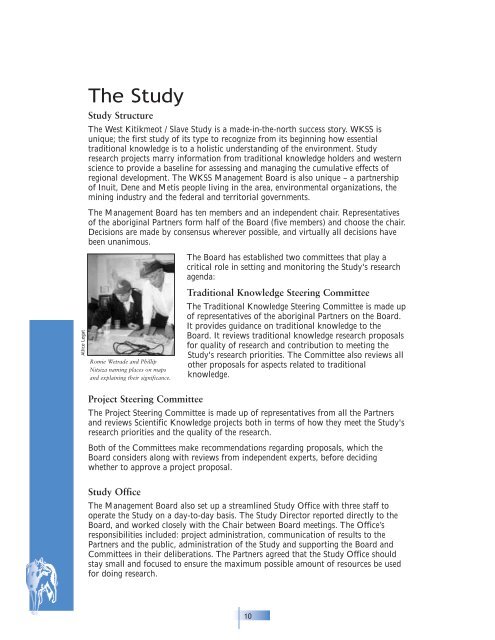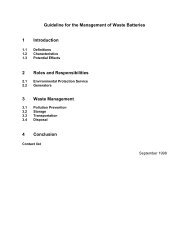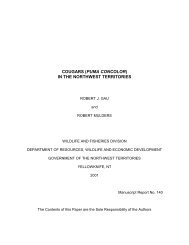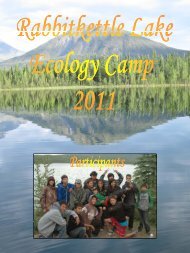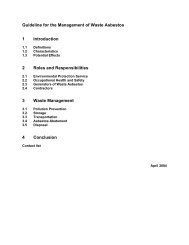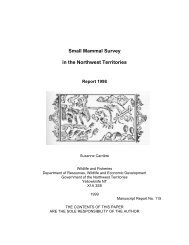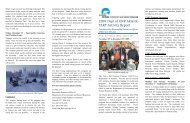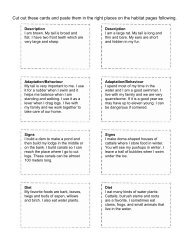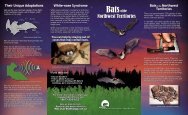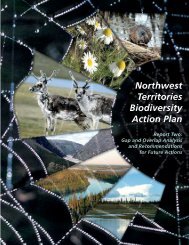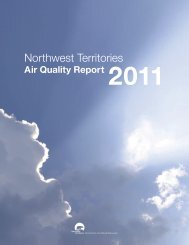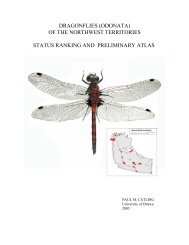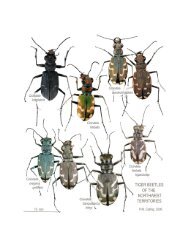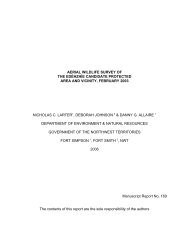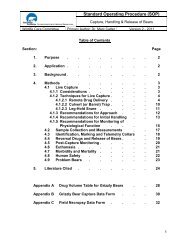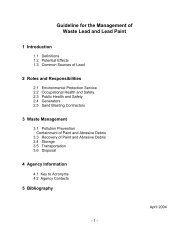WKSS Final Report 1996-2001 - Environment and Natural ...
WKSS Final Report 1996-2001 - Environment and Natural ...
WKSS Final Report 1996-2001 - Environment and Natural ...
Create successful ePaper yourself
Turn your PDF publications into a flip-book with our unique Google optimized e-Paper software.
Allice Legat<br />
The Study<br />
Study Structure<br />
The West Kitikmeot / Slave Study is a made-in-the-north success story. <strong>WKSS</strong> is<br />
unique; the first study of its type to recognize from its beginning how essential<br />
traditional knowledge is to a holistic underst<strong>and</strong>ing of the environment. Study<br />
research projects marry information from traditional knowledge holders <strong>and</strong> western<br />
science to provide a baseline for assessing <strong>and</strong> managing the cumulative effects of<br />
regional development. The <strong>WKSS</strong> Management Board is also unique – a partnership<br />
of Inuit, Dene <strong>and</strong> Metis people living in the area, environmental organizations, the<br />
mining industry <strong>and</strong> the federal <strong>and</strong> territorial governments.<br />
The Management Board has ten members <strong>and</strong> an independent chair. Representatives<br />
of the aboriginal Partners form half of the Board (five members) <strong>and</strong> choose the chair.<br />
Decisions are made by consensus wherever possible, <strong>and</strong> virtually all decisions have<br />
been unanimous.<br />
Romie Wetrade <strong>and</strong> Phillip<br />
Nitsiza naming places on maps<br />
<strong>and</strong> explaining their significance.<br />
The Board has established two committees that play a<br />
critical role in setting <strong>and</strong> monitoring the Study's research<br />
agenda:<br />
Traditional Knowledge Steering Committee<br />
The Traditional Knowledge Steering Committee is made up<br />
of representatives of the aboriginal Partners on the Board.<br />
It provides guidance on traditional knowledge to the<br />
Board. It reviews traditional knowledge research proposals<br />
for quality of research <strong>and</strong> contribution to meeting the<br />
Study's research priorities. The Committee also reviews all<br />
other proposals for aspects related to traditional<br />
knowledge.<br />
Project Steering Committee<br />
The Project Steering Committee is made up of representatives from all the Partners<br />
<strong>and</strong> reviews Scientific Knowledge projects both in terms of how they meet the Study's<br />
research priorities <strong>and</strong> the quality of the research.<br />
Both of the Committees make recommendations regarding proposals, which the<br />
Board considers along with reviews from independent experts, before deciding<br />
whether to approve a project proposal.<br />
Study Office<br />
The Management Board also set up a streamlined Study Office with three staff to<br />
operate the Study on a day-to-day basis. The Study Director reported directly to the<br />
Board, <strong>and</strong> worked closely with the Chair between Board meetings. The Office’s<br />
responsibilities included: project administration, communication of results to the<br />
Partners <strong>and</strong> the public, administration of the Study <strong>and</strong> supporting the Board <strong>and</strong><br />
Committees in their deliberations. The Partners agreed that the Study Office should<br />
stay small <strong>and</strong> focused to ensure the maximum possible amount of resources be used<br />
for doing research.<br />
10


